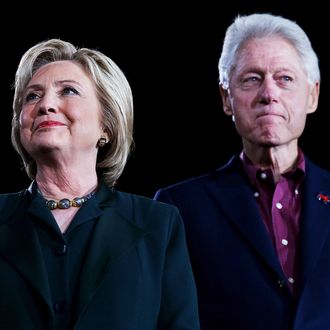
Bill Clinton’s unfortunate explosion in Philadelphia Thursday, wherein he dressed down Black Lives Matter protesters for interrupting his speech to criticize the 1994 crime legislation and 1996 welfare-reform legislation he signed as president, represents more than a tactical victory for BLM in forcing discussion of its priorities. It was a bigger victory for those across the political spectrum who want to reduce the Clinton presidency to “triangulation” — to a handful of highly symbolic moments in which the 42nd presidency was thought to have championed conservative policies to outflank Republicans and appeal to white reactionaries.
The amnesia involved in this retroactive argument is striking. Most accounts of yesterday’s incident and of the broader controversy over the Violent Crime Control and Law Enforcement Act of 1994 refer to that law as “Clinton’s crime bill.” It was not viewed that way at the time. The “Crime Bill,” as everyone called it, was the ultimate bipartisan legislative Christmas tree, driven by a decades-long rise in violent crime that reached its peak in the early 1990s. If there was any one “father” of the bill, it wasn’t Bill Clinton; it was Joe Biden, who maneuvered the unwieldy mess through the Senate. And by the time the final votes were cast, the Crime Bill wasn’t “about” mandatory sentencing or prison construction or any of the other provisions we’re talking about today; it was a gun-control bill that threw federal dollars at liberal social programs like “midnight basketball” along with Clinton’s pet COPS initiative to put 100,000 more police officers on the street.
Yes, late resistance to the bill from Congressional Black Caucus members should have drawn more attention to the implications of the law for nonviolent offenders and innocent African-American targets of the anti-crime backlash. But, in the end, not only Bernie Sanders but Ted Kennedy and Nancy Pelosi and Bill Bradley and Carol Moseley-Braun and Major Owens voted for the bill, while Strom Thurmond and Trent Lott voted against it. Are we to assume the latter were farsighted and racially sensitive solons? I don’t think so.
As for the welfare law, which Clinton also defended in his dustup with protesters yesterday, the bill he signed was drafted and enacted by House and Senate Republicans after they rejected his own welfare blueprint, and after he had vetoed two earlier bills that were then overhauled to address the president’s contention that they were “tough on kids and weak on work.” It was a famously close and excruciating call that divided the Clinton administration and White House and the Democratic Party. He half-apologized for the law as he signed it, and promised to fight to fix its more egregious features. (On Friday, he did the same for his remarks in Phildelphia, saying: “I almost want to apologize” for what he said in the exchange with the Black Lives Matter protesters — but didn’t quite do so.)
So why is the former president defending both laws as though they were indeed his signature accomplishments? Why can’t he just describe them as close calls on the messy products of the legislative sausage-making machine in a time of great social turmoil and move on? Why reinforce a reputation for being a “triangulator” who deliberately worked with the enemy to undercut his own party’s progressives?
Another incident of his presidency may help explain this problem. In 1995, Bill Clinton said this at a high-dollar Houston fund-raiser:
Probably there are people in this room still mad at me at that budget because you think I raised your taxes too much. It might surprise you to know that I think I raised them too much, too.
That was what he said about a budget that set the table for the long boom of the mid-to-late 1990s, contradicting almost universal Republican predictions that it would produce a recession.
For whatever reason, Bill Clinton has a tendency to listen too much to his critics and own things that were not really his. Unfortunately, and unfairly, his wife winds up owning them, too.






























